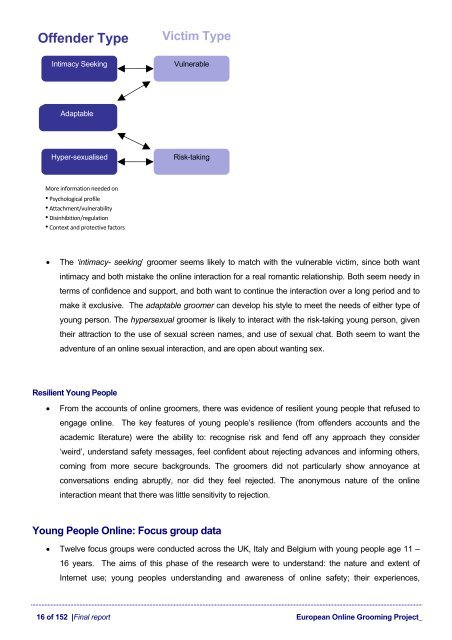Final Report - European Online Grooming Project
Final Report - European Online Grooming Project
Final Report - European Online Grooming Project
You also want an ePaper? Increase the reach of your titles
YUMPU automatically turns print PDFs into web optimized ePapers that Google loves.
Offender Type<br />
Victim Type<br />
Intimacy Seeking Vulnerable<br />
Adaptable<br />
Hyper-sexualised<br />
More information needed on<br />
• Psychological profile<br />
• Attachment/vulnerability<br />
• Disinhibition/regulation<br />
• Context and protective factors<br />
• The ‘intimacy- seeking’ groomer seems likely to match with the vulnerable victim, since both want<br />
intimacy and both mistake the online interaction for a real romantic relationship. Both seem needy in<br />
terms of confidence and support, and both want to continue the interaction over a long period and to<br />
make it exclusive. The adaptable groomer can develop his style to meet the needs of either type of<br />
young person. The hypersexual groomer is likely to interact with the risk-taking young person, given<br />
their attraction to the use of sexual screen names, and use of sexual chat. Both seem to want the<br />
adventure of an online sexual interaction, and are open about wanting sex.<br />
Resilient Young People<br />
Risk-taking<br />
• From the accounts of online groomers, there was evidence of resilient young people that refused to<br />
engage online. The key features of young people’s resilience (from offenders accounts and the<br />
academic literature) were the ability to: recognise risk and fend off any approach they consider<br />
‘weird’, understand safety messages, feel confident about rejecting advances and informing others,<br />
coming from more secure backgrounds. The groomers did not particularly show annoyance at<br />
conversations ending abruptly, nor did they feel rejected. The anonymous nature of the online<br />
interaction meant that there was little sensitivity to rejection.<br />
Young People <strong>Online</strong>: Focus group data<br />
• Twelve focus groups were conducted across the UK, Italy and Belgium with young people age 11 –<br />
16 years. The aims of this phase of the research were to understand: the nature and extent of<br />
Internet use; young peoples understanding and awareness of online safety; their experiences,<br />
16 of 152 |<strong>Final</strong> report <strong>European</strong> <strong>Online</strong> <strong>Grooming</strong> <strong>Project</strong>_


